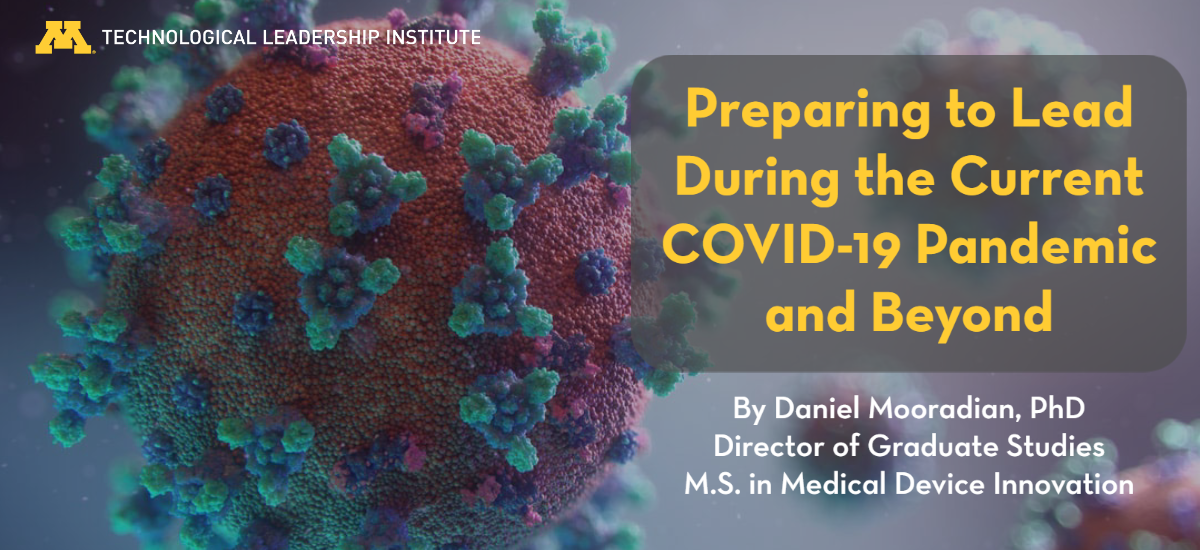Preparing to Lead During the Current COVID-19 Pandemic and Beyond

How many of us would have imagined a few short weeks ago just how quickly our lives could change?
We are now finding ourselves in the middle of a global healthcare crisis, a global economic crisis and a global humanitarian crisis. It is not the first, nor will it be the last we face, which makes it worth reflecting on essential skills that can help us contribute meaningful solutions at all levels of our organizations.
LEAD: When lives are at stake, as they are in the COVID-19 crisis, leaders are needed at all levels of an organization and society. The ability to collect, analyze and interpret data is not enough. The ability to fashion that data into a course of action (i.e. vision, mission, strategy, tactics) as well as — the will to advocate for, invest in, support and execute those actions — can make the difference between success and failure, between seizing competitive advantage or relinquishing it, and between saving lives or losing them.
MAKE DECISIONS: In a crisis of this magnitude, conditions can change rapidly, and decisions must be made quickly with limited information. Knowing the data you need, where to find it and how to analyze and present it are essential! Successful leaders have learned through study and experience to quickly and reliably evaluate both opportunity and risk. The resulting decisions are thoughtful, timely and data-driven. And finally ...
As this pandemic escalates at a record pace, leaders must be armed with the skills and knowledge to respond fast and as proactively as possible to keep us all safe.
INNOVATE: In a crisis, existing knowledge and resources may not be enough. Planning and execution alone will not suffice. New knowledge, new ways of thinking, new products and services may be required.
Each of TLI's three Master of Science degree programs addresses critical skills that are needed now more than ever as we face this global pandemic and the challenges that lie ahead.
In the area of healthcare, innovation requires not just an understanding of science, engineering and medicine, but also of business. Identifying unmet clinical needs, how to translate them into design solutions, how to build and test prototypes and how to mitigate the risks inherent in the commercialization of medical products are valuable skills for every med-tech organization. Our M.S. In Medical Device Innovation (MDI) graduates are among those on the front lines addressing some of the biggest unmet needs in this pandemic with critical leadership, decision-making and innovation skills.
Read about how 2017 MDI alumna Shannon (Smith) Williamson and Anna Peshock (MDI student, class of 2020) are helping people protect themselves with an innovative design for homemade masks.
As this pandemic escalates at a record pace, leaders must be armed with the skills and knowledge to respond fast and as proactively as possible to keep us all safe. The holistic approach used in TLI's M.S. of Security Technologies (MSST) program provides students with the skills and perspective to identify weaknesses in response planning and take actions to ensure organizations are ready and able to effectively cope with issues like pandemics. Students learn to identify and mitigate issues related to interdependencies in critical infrastructure. Investing in risk management and security mitigation requires an understanding of the whole system, not technical parts. The MSST program applies business leadership understanding to security challenges which can ensure the appropriate investments are made to secure an organization's future.
And as this pandemic takes its toll on the economy with both local and global businesses seeking ways to survive, we see the importance of technology in today's globally-connected world and the need for people who are adept at technology management, innovation and leadership. The M.S. in Management of Technology (MOT) program covers topics such as technology foresight and forecasting, strategic marketing and finance, team and organizational leadership, science and technology policy, business and executive communication, digital transformation and knowledge management, and pivotal and emerging technologies. Equally important, MOT students learn to connect the dots from technology development to business models to societal impact, all within a global context.
If you are interested in learning more about any of our programs and how they can help you advance your career with the skills to lead, attend one of TLI's upcoming information sessions or fill out this form to connect with an admissions associate.
About the Author

Daniel L. Mooradian, PhD
- Honeywell/James J. Renier Chair in Technology Management
- Senior Fellow
- Director of Graduate Studies - MDI
James J. Renier Chair in Technology Management
Daniel Mooradian is founder and president of The Simpatico Group LLC, chief science officer at Innova Medical Design, chief science officer at Novum Therapeutics, and leads TLI’s newest graduate program in Medical Device Innovation. In addition to serving as director of graduate studies for this program, he leads partnerships and course offerings for students in the medical device industry.